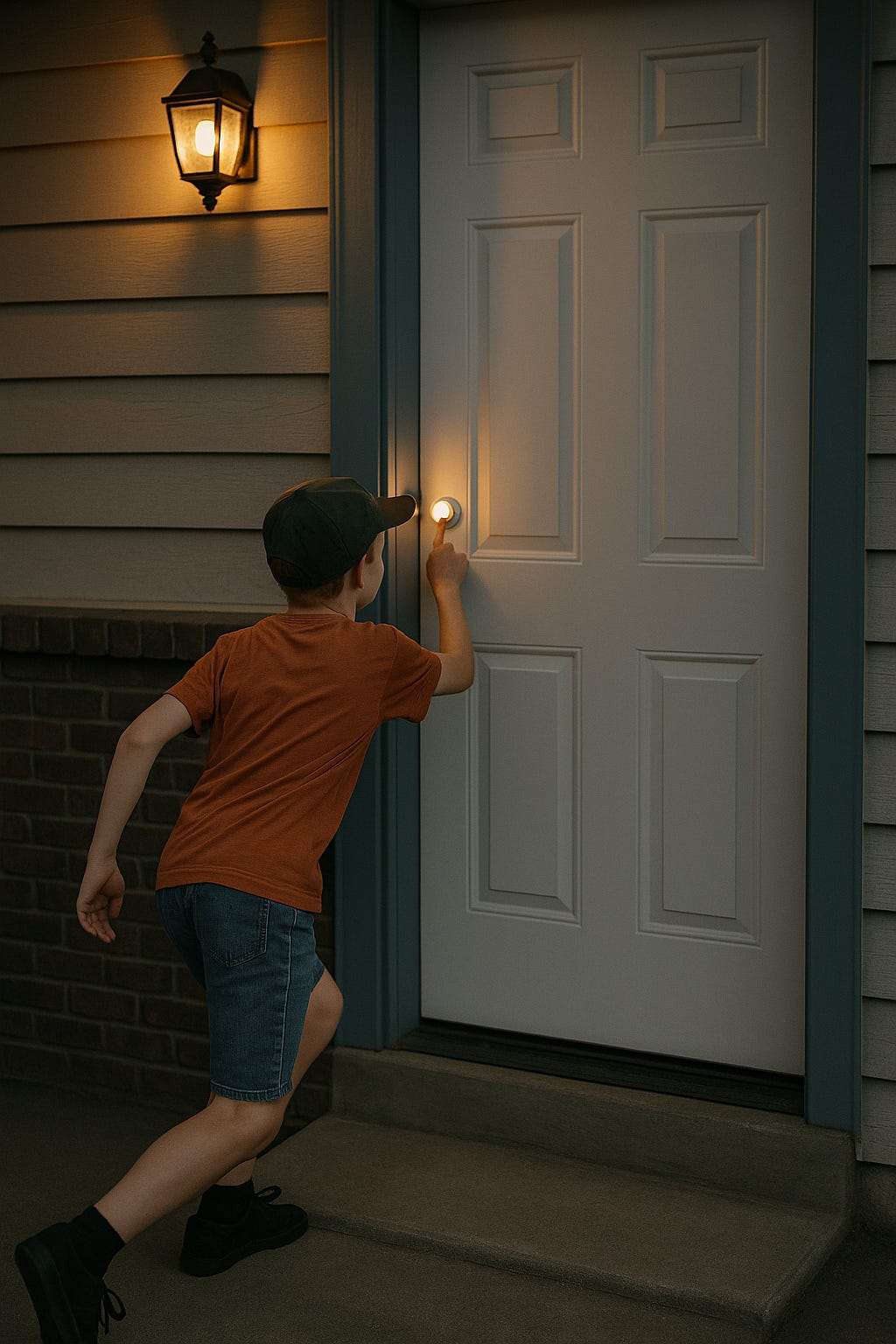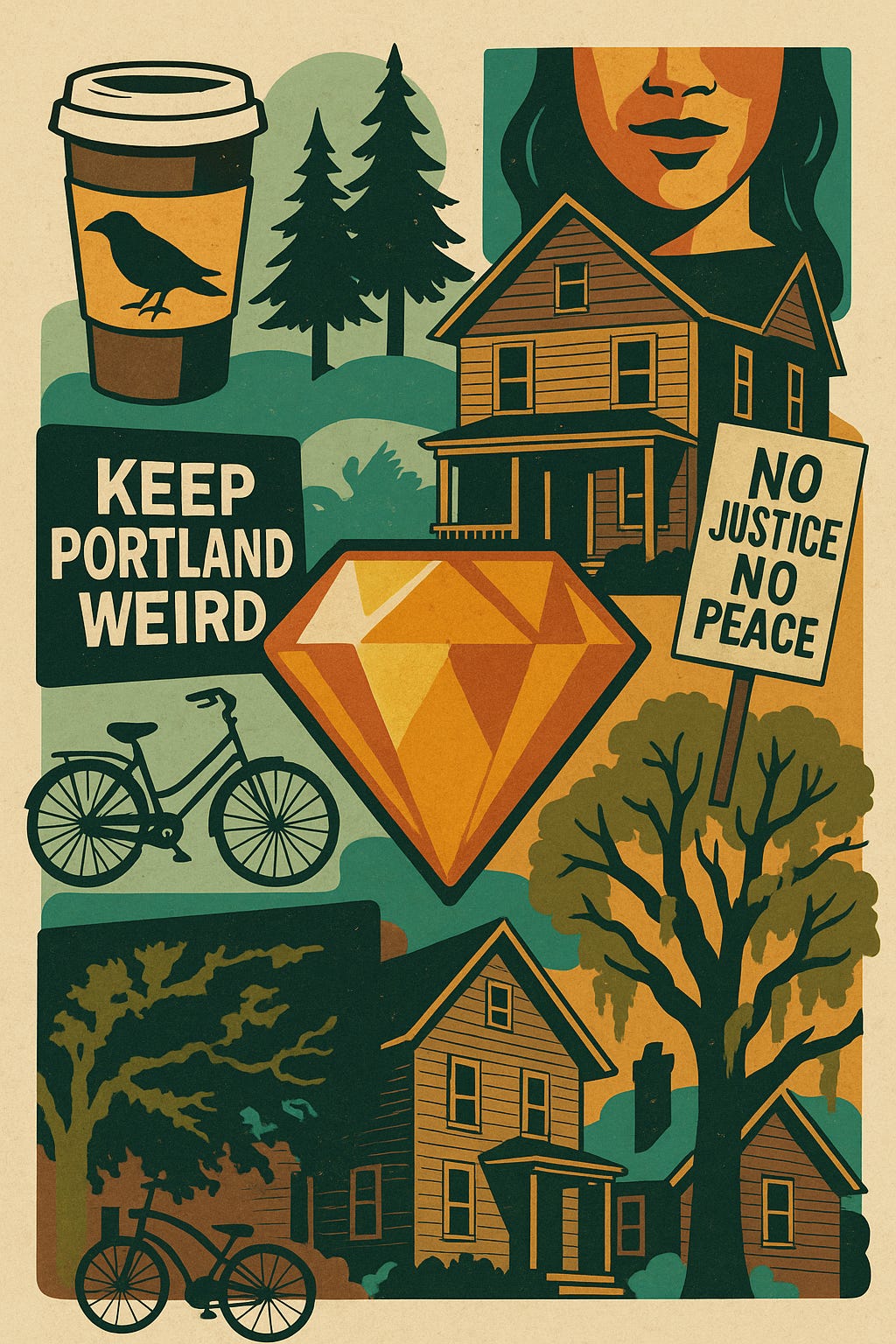Thinking Thursday #8
Portland, The Machine, and the illusion of magical whiteness.
Every week, I think out loud about something that won’t leave me alone — culture, memory, resistance, the machinery underneath what we call “normal.”
This week: Portland, The Machine, and the illusion of magical whiteness.
The Threshold
The first time it happened, I thought I’d imagined it—a sharp knock, the echo of feet, then silence.
A few days later, it came again. Kids playing Ding Dong Ditch.
On paper, it’s harmless: the oldest of childhood games, a test of boundaries, a little thrill before running away.
But standing there in my doorway—a Black woman in the Pacific Northwest—the sound hit differently.
It felt like being studied.
My home became an experiment in how far white childhood could roam before consequence.
When Black kids test boundaries, they get warned or worse. When white kids do it, it’s called curiosity.
The Machine
That’s when I realized it wasn’t just kids.
It was The Machine—America itself—teaching its rituals of trespass.
The Machine runs on extraction and repetition.
It refines power by making intrusion feel like play.
A doorbell becomes training for entitlement: Can you touch what isn’t yours and still be safe?
✴️ James Baldwin once wrote that “the white man’s crime is not his racism, but his blindness.”
✴️ bell hooks called it the imperialist white-supremacist capitalist patriarchy.
The Machine is that blindness mechanized—an inheritance of comfort disguised as innocence.
Magical Whiteness
Portland is where The Machine hums most sweetly.
Magical whiteness, I call it—the illusion of rebellion wrapped around entitlement.
Here, people resist by brand, protest by hashtag, and gentrify with good intentions.
“Keep Portland Weird” was supposed to sound radical, but really it meant, keep it ours.
✴️ This is a state founded with exclusion laws that banned Black people from settling here,
and a city once mapped by redlining so precise you could trace it street by street.
Those roots didn’t vanish—they composted into the soil of progressivism.
It’s tragic and disheartening to think Portland might be the purest form of whiteness—distilled, condensed, self-aware enough to joke about it but not to dismantle it.
Every mural of diversity is painted over land that once refused to house us.
The Orange Wasp — Then and Now
Back in 2020, the orange wasp descended on Portland under the banner of law and order.
Federal troops filled the streets, claiming to protect federal property while gassing the very people who were protesting police violence.
It was chaotic, brutal—and strategic.
Portland was the perfect target then: white, liberal, progressive on paper.
The city that branded itself as resistance became the test lab for repression.
The Machine needed a “safe” place to make militarized control look reasonable, even benevolent.
If you can send troops into a liberal, white-led city and call it protection,
then you can send them anywhere and call it prevention.
But what’s happening now is different.
This isn’t about quelling nightly protests or broken windows.
The Machine has evolved.
The National Guard is being federalized and deployed across state lines,
and the Insurrection Act is being whispered again—
this time as a preventive measure, not a reactive one.
Chicago is under federal surveillance.
Atlanta—the cradle of Black leadership—is being used as a training ground for urban warfare.
The message is no longer about restoring order.
It’s about reminding people what happens when they resist it.
Portland was the prototype.
Chicago and Atlanta are the expansion.
What’s being enforced isn’t safety.
It’s obedience.
And what’s being tested isn’t law—it’s loyalty.
Mary’s Refusal
That’s where Mary’s voice from Sinners returns to me.
I didn’t wanna be white, I wanted to be with you.
She wasn’t talking about race as color.
She was talking about the bargain—trading love and belonging for the trappings of whiteness: safety, success, distance.
She refused the exchange.
And in that refusal, I hear what Portland keeps missing.
The city keeps choosing the trappings—the performance of progress, the curated rebellion—over the intimacy of true connection.
Coda
America keeps humming, The Machine turning.
The orange wasp still circles, still claims to protect what was never his.
And me—still here, at the threshold, listening to the hum.
I didn’t wanna be white,
I whisper back to the jewel that thinks it knows freedom.
I wanted to be with you.💎
Outro / Author’s Note
Thinking Thursday is where I wrestle with contradictions — the ones that hum beneath progress and the ones that live inside me.
If this piece speaks to you, share it, quote it, argue with it — but mostly, sit with it.
You can also read my other essays in this series:
Intonation & Atonement (Tuesdays) — on sound, spirituality, and social rhythm
Neurodivergent Gumbo (Sundays) — on stories, media, and the myth of belonging
Until next time,
— Jewels




